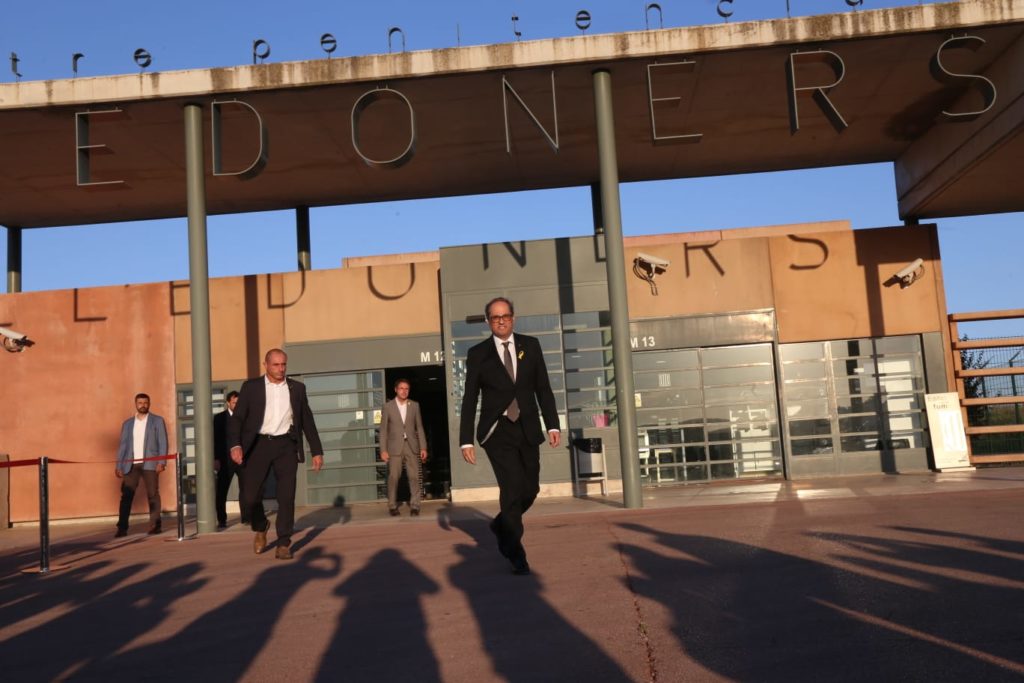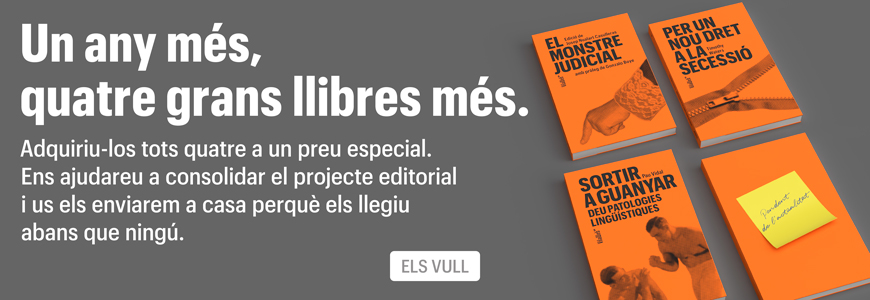05.07.2018 - 09:13
|
Actualització: 05.07.2018 - 11:13
President Quim Torra and parliament speaker Roger Torrent have visited the Catalan prisons now holding the jailed leaders on the same day of their relocation from Madrid region penitentiary centres. Pro-independence supporters gathered outside both prisons, calling for the release of the jailed officials and activists.
While Torra visited the Lledoners prison which will now hold Oriol Junqueras, Raúl Romeva, Jordi Cuixart and Jordi Sànchez, Torrent went to the Puig de les Basses centre holding female pro-independence leaders Dolors Bassa and Carme Forcadell. Both Torra and Torrent took part in marches outside the respective prisons.
President Torra, speaking outside the Lledoners prison, said he will not give up until the jailed leaders are free. After speaking with Bassa and Forcadell, Torrent said that he saw them as “strong, but being close to home is not being at home.” Protesters gathered throughout the day shouting “freedom” and waving pro-independence flags. The demonstrations outside the prisons carried on into the evening.
Six out of nine leaders in Catalan prisons
Six out of the nine Catalan leaders incarcerated have now been transferred to Catalan prisons after spending several months in Madrid penitentiaries. Two of them, Carme Forcadell and Dolors Bassa, left Alcalá-Meco center on Wednesday at 7.45am local time and arrived in the Puig de les Basses jail shortly after 4pm, in northern Catalonia, later on in the day after a short stopover in the Saragossa area.
The other four, including the former Catalan vice president Oriol Junqueras, started their journey around an hour later in the Zuera prison, also in the Saragossa region, were they spent a night while being transferred from two Madrid jails. They arrived in the Brians II center later in the morning, where they were moved to the nearby Lledoners prison at around 1pm.
‘Moral victory’ to pro-independence camp
In transferring jailed pro-independence leaders to prisons in Catalonia, the Spanish government is handing “moral victories” to the supporters of secession, said a senior member of the People’s Party (PP) on Wednesday. The Spanish authorities this week began relocating the political leaders awaiting trial for their part in the push for independence last year to Catalan prisons so they can be closer to their families.
PP’s Andrea Levy warned the Spanish president, Pedro Sánchez, whose successful motion of no confidence saw the PP government that jailed the officials ousted from power last month, that he should not “mistake” who his allies are in defending the interests of Spain, and should avoid going “hand in hand with the independence supporters.” Levy went on to say that Sánchez should ally with the unionist PP and Cs parties in the Spanish congress.
Yet, the Spanish government’s delegate to Catalonia, Teresa Cunillera, defended the decision, saying that the Sánchez executive had complied “with the law” and its “obligation” to move the prisoners. Cunillera also said that Monday’s meeting between Sánchez and Catalan president Quim Torra showed a willingness to find common ground. “We will not convince each other on issues beyond ideology, but we must look for spheres of agreement,” she said.
Act of justice
As for the pro-independence camp, the far-left CUP party welcomed the relocation of the prisoners and gave its support to the protests called outside the Catalan prisons to demand the release of the jailed political leaders. In a statement, CUP demanded the prisoners be released and the officials abroad be allowed to return, while it also described the transfer of the prisoners as an “act of justice taken into account by Spanish law.”
A senior MEP from the pro-independence Esquerra party (ERC) said he thought it was “terrible” that the Catalan government should have to keep “its own colleagues” in prison. In a news conference in Strasbourg, Josep-Maria Terricabras regretted that “we will be the jailers of our own innocent people,” and said that while transferring the prisoners to Catalonia was a gesture that helped the families, what was actually needed was “the release of the prisoners.”




